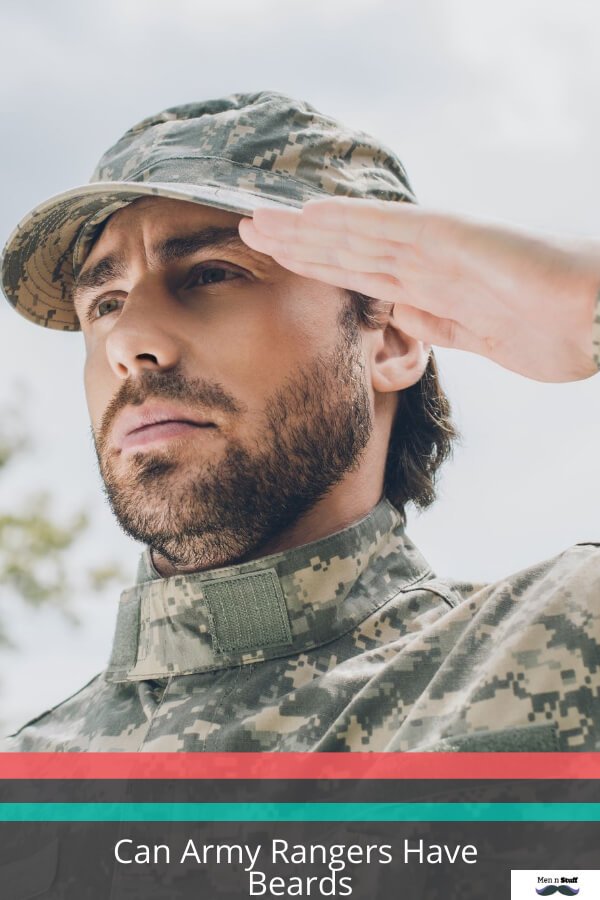Army Rangers are not allowed to have beards. This is because beards can interfere with the proper seal of gas masks and other protective equipment. According to Army Regulation 670-1, male soldiers are required to keep their hair neatly trimmed and their faces clean-shaven.

Can Army Rangers Have Beards?
1. General Grooming Standards
The Army’s regulations, as outlined in AR 670-1, clearly state that soldiers are required to maintain a clean and well-groomed appearance at all times. Being clean-shaven is part of the uniformity and discipline the Army seeks to instill in its personnel. This rule applies to all soldiers, including Army Rangers.
2. Religious Accommodations
There are exceptions granted, under precise conditions, to soldiers whose religious beliefs require them to wear beards. The Department of Defense issued regulations in 2014, permitting soldiers to request religious accommodations for beards, turbans, hijabs, and other religious expressions.
| 2014 Regulations | |
|---|---|
| Beards | Allowed under religious accommodations |
| Turbans | Allowed under religious accommodations |
| Hijabs | Allowed under religious accommodations |
3. Medical Exceptions
Another notable exemption applies to those suffering from certain skin conditions or injuries. If shaving exacerbates or causes an issue, a temporary or permanent shaving profile may be granted after evaluation by a military doctor.
4. Special Forces and Covert Operations
While typically expected to maintain the same grooming standards, it has been known for Army Rangers involved in Special Operations or covert missions to grow beards. This is done mainly when blending in with the local population or for psychological warfare advantages.
5. Not a Universal Right
Despite exceptions, the ability to grow a beard is not a given for Army Rangers or other military personnel. Beards must be neatly trimmed and not interfere with the performance of duties or with protective equipment.
In conclusion, while Army Rangers are generally expected to maintain clean-shaven appearances in alignment with overall Army grooming standards, there are certain exceptions. These include allowances due to medical or religious reasons, as well as mission-specific circumstances. However, these exceptions are not the norm, and the ability to grow a beard is not an inherent right in this position.
Army Rangers
Army Rangers are like the spear’s tip, and they are sent for fast recon or shock missions. Rangers are the Infantry who are highly trained. In the U.S., Army Rangers are considered to be a part of the SOF community. These Rangers fall under the jurisdiction of USASOC and USSOCOM.
They cannot mix in with the locals in a village or a town and need to follow AR 670 – 1 for grooming. Rangers are supposed to remain clean-shaven always until they have a waiver for shaving.
Difference Between Army Rangers And Special Forces
In the U.S., Army Special Forces are Green Berets. To understand in a better way, every member of the Special Forces is SOF community’s member; however, not all members are Special Forces in the SOF community.
Relaxed Grooming Standards For Army Rangers
At times the standards are relaxed for them or if there are extenuating circumstances where there is relaxation in the standards for Rangers, such as shaving every third day. The commanding officer gives relaxation to the member of the military. It usually happens when a Ranger is detached or deployed from the main unit.
It Is Allowed For Those Who Fall Under The Below-Mentioned Categories In The Table:
| S.No | Categories |
| 1 | SOF |
| 2 | Special Forces |
| 3 | SEALs |
| 4 | Delta Force |
| 5 | MARSOC |
However, the Rangers cannot grow a full beard like the Special Forces.
British Army Policy Of Beard
The policy of the British Army on facial hair was under the spotlight recently. For the first time, the Royal Air Force has allowed its personnel to grow beards under the rules. The change in rules was due to an effort to broaden and promote the recruitment pool. However, it insisted that the person still needs to maintain the higher standards of their appearance.
It is not a single country that is making changes in the standards of facial grooming. The Canadian National Defense is also examining its policy on facial hair and announcing to relax the rules on having a beard.
According to the Queen’s Regulations covered under section 5.366, the beards and whiskers worn should be neat and tidy. It can be worn if granted with authority under religious or medical grounds or where there is the tradition’s permission. Sideburns should not descend below the ear’s mid-point. Besides, the beard has to be trimmed horizontally.
U.S. Army Regulations For Facial Hair
Drum majors, Pioneer Sargents, Bugle Majors, Farriers, Goat Majors, and Pipe Majors are required and permitted to wear beards. All these individuals are traditionally found marching ahead of the formal parade. However, the beard has to be decent and not like a full-grown beard. This custom was originated and borrowed from the French in the late 18th century and at the beginning of the 19th century.
Following the bearded pioneers, there was a period between 1854 to 1856, after the Crimen War, when all soldiers were permitted to have beards; it became a fashion in the wider population.
During the 1860s, this custom had run the course, and there was the enforcement of regulations more rigorously. The beard was allowed only on those campaigns where water was scarce for shaving.
Army Regulation 670-1 in the U.S. states that all male members of the troop must be clean-shaven. They can have mustaches that should not touch the upper lip or the nose. Also, it should not expand the corners of the mouth.
The U.S. Army has stringent rules related to the Army Regulations for Facial hair. Rangers need to follow the standards of facial grooming, what is allowed, and what not as per Army policies in the U.S.
However, some Rangers do have beards that are exempted due to religious or medical reasons.
Changing Regulations By The U.S. Army
The U.S. Army has changed regulations at the beginning of 2017 by allowing the Sikh soldiers to grow beards. This change was done under an exemption of religion for the male grooming standards. The exemption was granted because the Sikh community is not supposed to shave their hair according to their religious belief.
The change in regulations surprised some members in the services as the small group got an exemption, which made the adage true that “Ask Ask Ask, and you shall get it.”
Special Ops Troops
For men in Afghanistan, the beard is a sign of manhood. It is because special operations troops want to earn the trust of local people. Hence, they tend to look like Grizzly Adams. For these special operations forces, beards help bring them close to Afghan people and keep them apart from conventional forces. Those traditional forces are supposed to follow strict grooming standards.
There has been a struggle standing long between the conventional Army and the special operations forces about whether these special operations forces should have a beard or not.
Forces with beards help bond with local Afghans regardless of what the circumstances are. However, at times the privilege of having a beard is abused by the troop. The troops need to maintain their grooming appearance properly, and conventional forces also need to understand that beard helps in the operations.
Beard For Army Rangers While On Deployment
Army Rangers can grow a beard while on deployment depending on their mission of deployment. The reason to grow a beard on deployment is for diplomacy with the local people in a village or a town who respect having it as a cultural norm. It depends on the factors and commands that you get daily and on the people who will be in contact with you.
FAQs.
1. Q1. Can Army Rangers Have Beards?
2. Q2. Can Army Rangers Have A Beard While They Are On Deployment?
3. Q3. What Is The Difference Between Army Rangers And Special Forces?
References:
https://www.goarmy.com/how-to-join/requirements/appearance.html
https://army.assurances.gov.gh/can-army-rangers-have-beards.html

